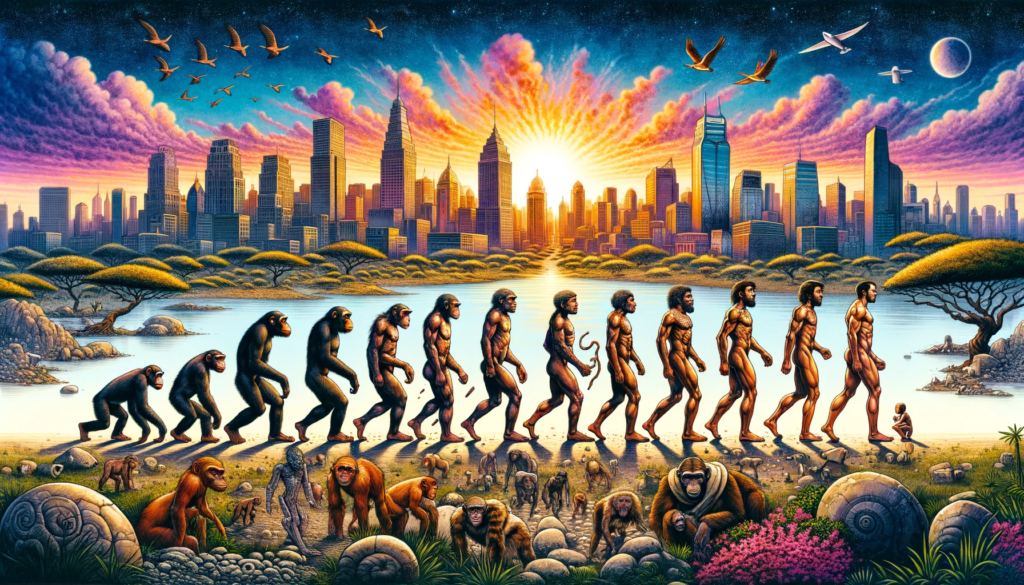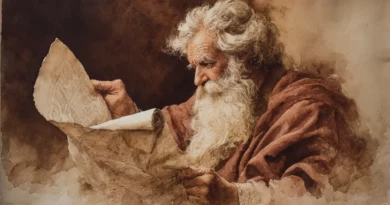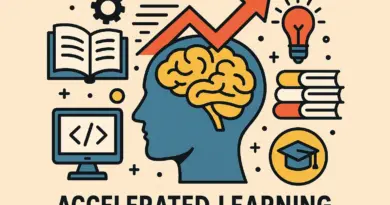Vídeo | Evolution’s great mystery
Explore os mistérios da evolução da linguagem humana no vídeo ‘Evolution’s great mystery’, apresentado por Michael Corballis e disponibilizado pelo canal TED-ed. Este vídeo fornece uma analisa a origem e a singularidade da linguagem humana, destacando a surpreendente habilidade de comunicação de um Bonobo chamado Kanzi na década de 1980. Com insights acadêmicos, Corballis aborda a distinção fundamental entre linguagem e comunicação, levantando questões sobre se outros seres vivos compartilham nossa capacidade de linguagem. O vídeo também investiga as raízes evolutivas da linguagem, sugerindo que ela pode ter se originado de gestos, evoluindo ao longo de milhões de anos. Este conteúdo é essencial para aqueles interessados em entender como a linguagem moldou a humanidade e vice-versa, representando um passo significativo na evolução humana.
| Audio | |
|---|---|
Normal | Slow |
| English Transcript | Tradução |
| In the 1980s, a bonobo named Kanzi learned to communicate with humans to an unprecedented extent - not through speech or gestures, but using a keyboard of abstract symbols representing objects and actions. | Na década de 1980, um bonobo chamado Kanzi aprendeu a se comunicar com humanos de forma sem precedentes - não por fala ou gestos, mas usando um teclado de símbolos abstratos representando objetos e ações. |
| By pointing to several of these in order, he created sequences to make requests, answer verbal questions from human researchers, and refer to objects that weren't physically present. | Ao apontar para vários desses em sequência, ele criava sequências para fazer pedidos, responder a perguntas verbais de pesquisadores humanos e referir-se a objetos que não estavam fisicamente presentes. |
| Kanzi's exploits ignited immediate controversy over one question: had Kanzi learned language? | As façanhas de Kanzi geraram controvérsia imediata sobre uma questão: Kanzi tinha aprendido a linguagem? |
| What we call language is something more specific than communication. | O que chamamos de linguagem é algo mais específico do que comunicação. |
| Language is about sharing what's in our minds: stories, opinions, questions, the past or future, imagined times or places, ideas. | Linguagem é sobre compartilhar o que está em nossas mentes: histórias, opiniões, perguntas, o passado ou futuro, tempos ou lugares imaginados, ideias. |
| It is fundamentally open-ended, and can be used to say an unlimited number of things. | É fundamentalmente aberta e pode ser usada para dizer um número ilimitado de coisas. |
| Many researchers are convinced that only humans have language, that the calls and gestures other species use to communicate are not language. | Muitos pesquisadores estão convencidos de que apenas os humanos têm linguagem, que os chamados e gestos que outras espécies usam para se comunicar não são linguagem. |
| Each of these calls and gestures generally corresponds to a specific message, for a limited total number of messages that aren't combined into more complex ideas. | Cada um desses chamados e gestos geralmente corresponde a uma mensagem específica, para um número total limitado de mensagens que não são combinadas em ideias mais complexas. |
| For example, a monkey species might have a specific warning call that corresponds to a particular predator, like a snake - but with language, there are countless ways to say "watch out for the snake". | Por exemplo, uma espécie de macaco pode ter um chamado de alerta específico que corresponde a um predador particular, como uma cobra - mas com a linguagem, há inúmeras maneiras de dizer "cuidado com a cobra". |
| So far no animal communication seems to have the open-endedness of human language. | Até agora, nenhuma comunicação animal parece ter a abertura da linguagem humana. |
| We don't know for sure what's going on in animals' heads, and it's possible this definition of language, or our ways of measuring it, don't apply to them. | Não sabemos ao certo o que se passa na cabeça dos animais, e é possível que esta definição de linguagem, ou nossas maneiras de medi-la, não se apliquem a eles. |
| But as far as we know, only humans have language. | Mas, pelo que sabemos, apenas os humanos têm linguagem. |
| And while humans speak around 7,000 distinct languages, any child can learn any language, indicating that the biological machinery underlying language is common to all of us. | E enquanto os humanos falam cerca de 7.000 línguas distintas, qualquer criança pode aprender qualquer língua, indicando que a maquinaria biológica subjacente à linguagem é comum a todos nós. |
| So what does language mean for humanity? | Então, o que a linguagem significa para a humanidade? |
| What does it allow us to do, and how did we come to have it? | O que ela nos permite fazer, e como chegamos a tê-la? |
| Exactly when we acquired this capacity is still an open question. | Exatamente quando adquirimos essa capacidade ainda é uma questão aberta. |
| Chimps and bonobos are our closest living relatives, but the lineage leading to humans split from the other great apes more than four million years ago. | Chimpanzés e bonobos são nossos parentes vivos mais próximos, mas a linhagem que levou aos humanos se separou dos outros grandes primatas há mais de quatro milhões de anos. |
| In between, there were many species - all of them now extinct, which makes it very difficult to know if they had language or anything like it. | Entre eles, havia muitas espécies - todas agora extintas, o que torna muito difícil saber se elas tinham linguagem ou algo parecido. |
| Great apes give one potential clue to the origins of language, though: it may have started as gesture rather than speech. | Os grandes primatas dão uma pista potencial para as origens da linguagem: ela pode ter começado como gesto em vez de fala. |
| Great apes gesture to each other in the wild much more freely than they vocalize. | Os grandes primatas gesticulam uns para os outros na natureza muito mais livremente do que vocalizam. |
| Language may have begun to take shape during the Pleistocene, 2 to 3 million years ago, with the emergence of the genus Homo that eventually gave rise to our own species, homo sapiens. | A linguagem pode ter começado a tomar forma durante o Pleistoceno, de 2 a 3 milhões de anos atrás, com o surgimento do gênero Homo que eventualmente deu origem à nossa própria espécie, Homo sapiens. |
| Brain size tripled, and bipedalism freed the hands for communication. | O tamanho do cérebro triplicou, e o bipedalismo libertou as mãos para comunicação. |
| There may have been a transition from gestural communication to gestural language - from pointing to objects and pantomiming actions - to more efficient, abstract signing. | Pode ter havido uma transição da comunicação gestual para a linguagem gestual - de apontar para objetos e pantomimar ações - para uma sinalização mais eficiente e abstrata. |
| The abstraction of gestural communication would have removed the need for visuals, setting the stage for a transition to spoken language. | A abstração da comunicação gestual teria removido a necessidade de visuais, preparando o terreno para uma transição para a linguagem falada. |
| That transition would have likely come later, though. | Essa transição provavelmente veio mais tarde, no entanto. |
| Articulate speech depends on a vocal tract of a particular shape. | Fala articulada depende de um trato vocal de uma forma particular. |
| Even our closest ancestors, the Neanderthals and Denisovans, had vocal tracts that were not optimal, though they likely had some vocal capacity, and possibly even language. | Mesmo nossos ancestrais mais próximos, os Neandertais e Denisovanos, tinham tratos vocais que não eram ótimos, embora provavelmente tivessem alguma capacidade vocal, e possivelmente até linguagem. |
| Only in humans is the vocal tract optimal. | Apenas em humanos o trato vocal é ótimo. |
| Spoken words free the hands for activities such as tool use and transport. | Palavras faladas liberam as mãos para atividades como o uso de ferramentas e transporte. |
| So it may have been the emergence of speech, not of language itself, that led to the dominance of our species. | Então, pode ter sido o surgimento da fala, não da linguagem em si, que levou ao domínio de nossa espécie. |
| Language is so intimately tied to complex thought, perception, and motor functions that it's difficult to untangle its biological origins. | Linguagem está tão intimamente ligada ao pensamento complexo, percepção e funções motoras que é difícil desvendar suas origens biológicas. |
| Some of the biggest mysteries remain: to what extent did language as a capacity shape humanity, and to what extent did humanity shape language? | Alguns dos maiores mistérios permanecem: em que medida a linguagem como capacidade moldou a humanidade, e em que medida a humanidade moldou a linguagem? |
| What came first, the vast number of possible scenarios we can envisage, or our ability to share them? | O que veio primeiro, o vasto número de cenários possíveis que podemos imaginar, ou nossa capacidade de compartilhá-los? |
Contagem de palavras
A tabela abaixo exibe as palavras encontradas neste texto, bem como o número de vezes em que aparecem.
Veja também: Para que serve esta tabela?
| Freq. | Palavra | Freq. | Palavra | Freq. | Palavra |
|---|---|---|---|---|---|
| 32 | to | 24 | the | 22 | language |
| 19 | of | 16 | and | 13 | a |
| 11 | that | 11 | is | 11 | have |
| 10 | it | 9 | for | 8 | what |
| 8 | not | 7 | our | 7 | in |
| 6 | we | 6 | or | 6 | humans |
| 5 | species | 5 | more | 5 | communication |
| 5 | as | 5 | are | 4 | vocal |
| 4 | than | 4 | speech | 4 | so |
| 4 | shape | 4 | may | 4 | had |
| 4 | from | 4 | but | 3 | with |
| 3 | were | 3 | transition | 3 | though |
| 3 | they | 3 | there | 3 | them |
| 3 | specific | 3 | other | 3 | open |
| 3 | only | 3 | objects | 3 | number |
| 3 | know | 3 | kanzi | 3 | humanity |
| 3 | great | 3 | gestures | 3 | gestural |
| 3 | extent | 3 | do | 3 | did |
| 3 | capacity | 3 | can | 3 | apes |
| 3 | an | 2 | years | 2 | would |
| 2 | ways | 2 | use | 2 | us |
| 2 | tract | 2 | this | 2 | these |
| 2 | spoken | 2 | some | 2 | snake |
| 2 | say | 2 | s | 2 | researchers |
| 2 | questions | 2 | question | 2 | possible |
| 2 | pointing | 2 | particular | 2 | origins |
| 2 | optimal | 2 | one | 2 | on |
| 2 | million | 2 | many | 2 | likely |
| 2 | like | 2 | learned | 2 | ideas |
| 2 | human | 2 | homo | 2 | hands |
| 2 | gesture | 2 | far | 2 | even |
| 2 | emergence | 2 | each | 2 | does |
| 2 | difficult | 2 | corresponds | 2 | complex |
| 2 | communicate | 2 | come | 2 | closest |
| 2 | calls | 2 | call | 2 | biological |
| 2 | been | 2 | any | 2 | all |
| 2 | ago | 2 | actions | 2 | abstract |
| 1 | words | 1 | wild | 1 | while |
| 1 | which | 1 | when | 1 | watch |
| 1 | warning | 1 | vocalize | 1 | visuals |
| 1 | very | 1 | verbal | 1 | vast |
| 1 | using | 1 | used | 1 | untangle |
| 1 | unprecedented | 1 | unlimited | 1 | underlying |
| 1 | tripled | 1 | transport | 1 | tracts |
| 1 | total | 1 | tool | 1 | times |
| 1 | tied | 1 | through | 1 | thought |
| 1 | things | 1 | take | 1 | symbols |
| 1 | sure | 1 | such | 1 | stories |
| 1 | still | 1 | started | 1 | stage |
| 1 | split | 1 | speak | 1 | something |
| 1 | size | 1 | signing | 1 | sharing |
| 1 | share | 1 | several | 1 | setting |
| 1 | sequences | 1 | seems | 1 | scenarios |
| 1 | sapiens | 1 | rise | 1 | requests |
| 1 | representing | 1 | removed | 1 | remain |
| 1 | relatives | 1 | refer | 1 | rather |
| 1 | present | 1 | predator | 1 | potential |
| 1 | possibly | 1 | pleistocene | 1 | places |
| 1 | physically | 1 | perception | 1 | past |
| 1 | pantomiming | 1 | own | 1 | over |
| 1 | out | 1 | order | 1 | opinions |
| 1 | now | 1 | no | 1 | need |
| 1 | neanderthals | 1 | named | 1 | mysteries |
| 1 | much | 1 | motor | 1 | monkey |
| 1 | minds | 1 | might | 1 | messages |
| 1 | message | 1 | measuring | 1 | mean |
| 1 | makes | 1 | make | 1 | machinery |
| 1 | living | 1 | lineage | 1 | limited |
| 1 | led | 1 | learn | 1 | leading |
| 1 | later | 1 | languages | 1 | keyboard |
| 1 | itself | 1 | its | 1 | into |
| 1 | intimately | 1 | indicating | 1 | immediate |
| 1 | imagined | 1 | ignited | 1 | if |
| 1 | how | 1 | heads | 1 | he |
| 1 | going | 1 | give | 1 | genus |
| 1 | generally | 1 | gave | 1 | future |
| 1 | fundamentally | 1 | functions | 1 | freely |
| 1 | freed | 1 | free | 1 | four |
| 1 | first | 1 | extinct | 1 | exploits |
| 1 | example | 1 | exactly | 1 | eventually |
| 1 | envisage | 1 | endedness | 1 | ended |
| 1 | efficient | 1 | during | 1 | dominance |
| 1 | distinct | 1 | depends | 1 | denisovans |
| 1 | definition | 1 | created | 1 | countless |
| 1 | convinced | 1 | controversy | 1 | common |
| 1 | combined | 1 | clue | 1 | chimps |
| 1 | child | 1 | came | 1 | by |
| 1 | brain | 1 | bonobos | 1 | bonobo |
| 1 | bipedalism | 1 | biggest | 1 | between |
| 1 | begun | 1 | be | 1 | articulate |
| 1 | around | 1 | apply | 1 | anything |
| 1 | answer | 1 | animals | 1 | animal |
| 1 | ancestors | 1 | allow | 1 | activities |
| 1 | acquired | 1 | abstraction | 1 | about |
| 1 | ability |









